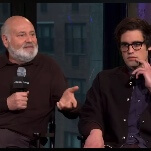Killed is dotted with pieces like Ted Rall's Father's Day essay on his own absentee father, Rich Cohen's memoir of the degradation he suffered as a fraternity pledge, Julian Rubinstein's personal anecdote about a dope deal gone sour, and Gerald Hannon's report on his second job as a middle-aged male prostitute. All the writers are stubbornly unapologetic, which ultimately cost them money. In the short introduction to these and a handful of other pieces—including Mike Sager's Palestinian slice of life "Travels With Bassem" and T.D. Allman's Tiananmen Square update "Living Well Is The Best Revenge"—the writers describe the sick, angry feeling when an editor called to tell them that their work was too sour or too somber for the publication's image.
The stories behind these stories sometimes overshadow the stories themselves, which—since Killed ranges from the '40s to the present—have occasionally lost some relevancy. The tabled book reviews, in particular, are rarely as good as the anecdotes that explain their fate. And, though it's historically useful to read the Betty Friedan article that became The Feminine Mystique, the piece's revelation about the intellectual life of women is, thank goodness, no longer alarming. But Killed also contains some too-good-to-die material. The highlight of the collection is Erik Hedegaard's "The Lay-Z-Boy Position": The funny, shocking sketch about John Mellencamp's smoking habits was turned down by a string of magazines afraid of alienating their tobacco-industry accounts. Hedegaard's story provides ample reason to fear the future of journalism, and to hope for more books like this one.























![HBO teases new Euphoria, Larry David, and much more in 2026 sizzle reel [Updated]](https://img.pastemagazine.com/wp-content/avuploads/2025/12/12100344/MixCollage-12-Dec-2025-09-56-AM-9137.jpg)

















